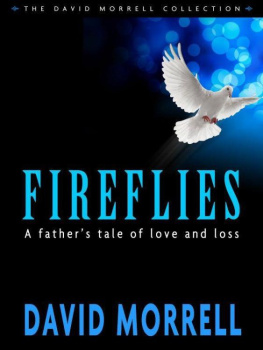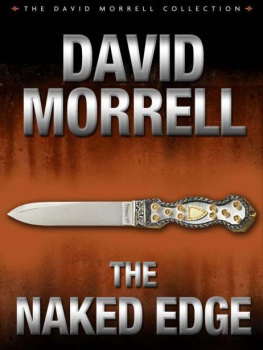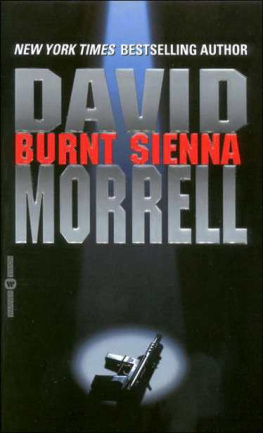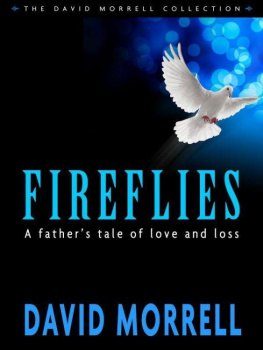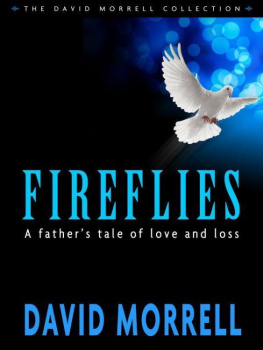DAVID MORRELL
FIREFLIES
Excerpt from Sweeney Agonists in Collected Poems 1909-1962 by T.S. Eliot, copyright 1936 by Harcourt Brace Jovanovich, Inc., copyright 1963, 1964 by T.S. Eliot, reprinted by permission of the publisher.
Excerpt from Burnt Notion in Four Quartets , copyright 1943 by T.S. Eliot, renewed 1971 by Esme Valerie Eliot, reprinted by permission of Harcourt Brace Jovanovich, Inc.
Copyright 1988 by David Morrell
Afterword copyright 1999 by Morrell Enterprises, Inc.
All rights reserved.
Acknowledgments
This book is dedicated to the staff, nurses, and physicians at the University of Iowas Hospitals and Clinics. One of the largest teaching and research hospitals in the United States, it exemplifies the best, in terms of both skill and humane values, that the medical profession ideally represents.
The nurses who administered to my son are too many to mention by name. Each did her or his part with utmost sensitivity and talent. My wife, my daughter, and I remember you with gratitude and love.
Of the physicians who cared for Matt, special thanks are due to Drs. Raymond Tannous, Janet Graeve, Kevin Pringle, Roger Giller, Brian Wicklund, Michael Trigg, Robert Soper, C. Thomas Kisker, and Pedro De Alarcon.
Thanks are also due to Cecilia Coulas, Diane and Michael Batty, Barbara and Richard Montross, Helen and Nicholas Rossi, and Gloria and Rudolph Galask, without whose compassionate support my family and I would have felt even more lost. Fathers Henry Greiner and Greg Miller, true servants of God, provided the spiritual consolation we so desperately craved.
But finally, crucially, this book is dedicated to Matthew.
God love you, son. Watch over us. We did our best to watch over you.
Contents
PROLOGUE
THE RETURN OF THE ANCIENT MARINERPART ONE
TO FEAR TO GO INTO THE DARKPART TWO
A POWER RAGE BEYOND COMPREHENSIONPART THREE
PANIC ATTACKPART FOUR
DJ VUEPILOGUE
THE REFRAIN OF THE ANCIENT MARINERAFTERWORD
LOOK HOMEWARD, ANGEL
Give sorrow words: the grief that does not speak
Whispers the oer-fraught heart, and bids it break.
S HAKESPEARE
Macbeth
Prologue
THE RETURN OF
THE ANCIENT MARINER
A well-known novelist friend (I see him seldom but think of him fondly) once began a famous book with one of the most arresting passages Ive ever encountered. The novel was Ghost Story , its author Peter Straub.
And this is how he started.
What was the worst thing youve ever done? I wont tell you that, but Ill tell you the worst thing that ever happened to me the most dreadful thing.
Precisely.
Ive borrowed Peters words because they so perfectly express what Im feeling. The worst thing Ive ever done? Ill leave that troubling question for a different book.
But the worst thing that ever happened to me? The most dreadful thing? I can tell you that with absolute certainty. Indeed, with terrible compulsion, I find myself driven to describe that ordeal. My effort isnt voluntary. It comes in torturous rushes. Distraught, I remind myself of Coleridges Ancient Mariner, in a frenzy stopping friends and strangers to tell of my woe, as if by describing it often enough, I can numb myself and blunt the wordsand in so doing heal myself of the cause behind the words.
The efforts impossible, I suspect. Certainly, it didnt work for the Ancient Mariner. After killing a bird of good omen and enduring a consequent nightmarish sea voyage, he managed to return to shore.
Forthwith this frame of mine was wrenched
With a woful agony,
Which forced me to begin my tale;
And then it left me free.
Left him free? Well, apparently not, for Coleridge adds a marginal note that ever and anon throughout his future life an agony constraineth him to travel from land to land.
Since then, at an uncertain hour,
That agony returns:
And till my ghastly tale is told,
This heart within me burns.
Im no more free than the Ancient Mariner. To be sure, I havent killed a bird of good omen, though I recently saw a metaphoric version of such a bird dieand three days later I saw a literal bird, very much alive, that seemed to be a reincarnation of the departed soul of the first. A cryptic reference? You bet. Necessarily so, and soon to be explained. A mystical experience; and along with terror, sorrow, agony, guilt, compassion, God, and redemption, its very much a part of my tale. For like the Ancient Mariner, my heart surely burns to tell youonce and for all, to be done with my tale, to exorcise my demons, to gain and preserve my faith.
Men fear death as children fear to go in the dark; and as that natural fear in children is increased with tales, so is the other. FRANCIS BACON
Of Death
Fear. For almost twenty years as a fiction writer, Ive focused on terror as my main subject. Ive always believed, as Sartre in Nausea , that real life is so fundamentally boring that we need adventure fiction to help soothe our ennui, to take us out of the doldrums of actuality. The paradox, of course, is that if we ever truly experienced a thriller, we would find it so terrifying we would wish with all the power of our being to be returned to the safe but depressing boredom of reality.
T. S. Eliot puts it this way in Sweeney Agonistes:
Ill carry you off
To a cannibal isle
Nothing to eat but the fruit as it grows
Nothing at all but three things.
What things?
Birth, and copulation, and death.
Id be bored.
Bored? I dont think so. Not me any longer. For I have seen real life at its starkest. Ive learned that copulation and birth have an unavoidable consequence: death. Despite what I used to think (and what Sartre thought), I know this muchthat real life, whatever else it might be, isnt boring.
Because recently I was overwhelmed by a massive dose of my subject matter. I came face-to-face with terror, and now I have trouble writing thrillers. Having encountered death, I find that to write about it using the conventions of a thriller makes me feel Im holding back, leaving out deaths grisly secret. And yet to include that secret would be to negate the distracting purpose of a thriller.
So to tell my tale Ive compromised. Most of what youre about to read is fact. I still cant believe it happened, but God have mercy, it did, and I feel an obligation to tell it. Since others have suffered as I and my family have, perhaps from our experience and the lessons we strained to learn, others will learn and find solace. In the aftermath of the loss we endured, we took great comfort in Harold S. Kushners When Bad Things Happen to Good People. But the book youre now reading is different from Kushners in many respects. For one thing, his excellent volume (though prompted, as was mine, by a personal tragedy) is a wide-ranging discussion of crises of faith that he encountered among troubled members of his synagogue.
For another, his book is totally factual.
However, Fireflies devotes itself exclusively to one familys tragedy, and though almost completely factual, it does have elements of fiction. Not the fireflies, the dove, and the other mystical experiences I will describe. I assure you they did happen. Still, because I wanted to make a statement about grief, about faith and the afterlife, I imposed a frame of fiction onto fact. In an epilogue, Ill explain where fact and fiction diverge. Ill also explain my reasons for blending the two, and my conclusion will, I hope, be spiritually rewarding.
Can I see anothers woe,
And not be in sorrow too?
Can I see anothers grief,
And not seek for kind relief?
WILLIAM BLAKE
Songs of Innocence ,
On Anothers Sorrow
TO FEAR TO GO INTO
THE DARK
Next page
